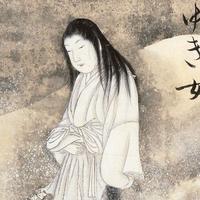雪 女 | 雪 女 の 恩返し
ゆき|おんな|ゆき|おんな||おんがえし
Snow Woman - Snow Womans Gegenleistung.
Yuki Onna | Return of the Snow Onna
Mujer de Nieve - El favor de vuelta de la Mujer de Nieve.
Femme des neiges - Le retour de faveur de la femme des neiges.
Mulher da Neve - O favor de retorno da Mulher da Neve.
Snökvinnan - Snökvinnans gentjänst.
むかし むかし 、ある 村 は ずれ に 、大 金持ち の 家 と 貧乏な 家 が ありました。
|||むら||||だい|かねもち||いえ||びんぼうな|いえ||
Es war einmal am Rande eines Dorfes, da lebten ein reicher Mann und ein armer Mann.
Once upon a time, on the outskirts of a village, there was a rich man's house and a poor man's house.
ある 、吹雪 の 夜 です。
|ふぶき||よ|
One night in a blizzard.
白い 着物 を 着た 美しい 娘 が 、お 金持ち の 家 の 戸 を 叩きました。
しろい|きもの||きた|うつくしい|むすめ|||かねもち||いえ||と||たたきました
Ein schönes Mädchen in einem weißen Kimono klopfte an die Tür des reichen Mannes.
A beautiful girl in a white kimono knocked on the rich man's door.
「わたし は 旅 の者 です が 、この 吹雪 で 困って おります。
||たび|の しゃ||||ふぶき||こまって|
"I am a traveler, and I am in trouble with this blizzard.
どうか 今夜 一晩 、泊めて 下さいません か?
|こんや|ひとばん|とめて|くださいません|
Could you please let me stay here for the night tonight?
」
"
すると 金持ち の 主人 は、
|かねもち||あるじ|
Then the rich master said,
「はん。
"stamp.
お前 が どう なろう と 、わし の 知った 事 か」
おまえ|||||||しった|こと|
No matter what happens to you, this is what I know."
と 、ぴしゃり と 戸 を 閉めて しまいました。
|||と||しめて|
I slammed the door shut.
そこ で 娘 は 仕方なく 、隣 の 貧乏な 家 に 行って 戸 を 叩きました。
||むすめ||しかたなく|となり||びんぼうな|いえ||おこなって|と||たたきました
So the girl had no choice but to go to the poor house next door and knock on the door.
「わたし は 旅 の者 です が 、この 吹雪 で 困って おります。
||たび|の しゃ||||ふぶき||こまって|
"I am a traveler, and I am in trouble with this blizzard.
どうか 今夜 一晩 、泊めて 下さいません か?
|こんや|ひとばん|とめて|くださいません|
Could you please let me stay here for the night tonight?
」
すると 貧乏な 家 の お 百姓 さん は、
|びんぼうな|いえ|||ひゃくしょう||
Then the poor farmer said,
「さあ 、早く 中 へ お 入り。
|はやく|なか|||はいり
"Come on, let's go inside.
大した 物 は ない が 、こんな 所 で よかったら 、遠慮 なく 泊まって いく が いい よ」
たいした|ぶつ|||||しょ|||えんりょ||とまって||||
It's not a big deal, but if you're happy with a place like this, feel free to stay the night."
と 、娘 を いろり の そば へ 座ら せて 、火 を 大きく して あげました。
|むすめ||||||すわら||ひ||おおきく||
Then he made her sit by the hearth and made the fire bigger.
そして 、おかみ さん も、
And my wife also
「外 は 寒かった でしょう。
がい||さむかった|
"It must have been cold outside.
こんな 物 で よかったら 、食べて おくれ」
|ぶつ|||たべて|
If you like something like this, please eat it."
と 、自分 たち が 食べる 分 の おかゆ を 、娘 に 出して くれた のです。
|じぶん|||たべる|ぶん||||むすめ||だして||
Then he gave his daughter enough rice porridge for them to eat.
それ を 一口 食べた 娘 は、
||ひとくち|たべた|むすめ|
The daughter who took a bite of it
「ありがとう ございます。
おかげ で 生き返った 様 な 気持ち です」
||いきかえった|さま||きもち|
I feel like I've been revived thanks to you."
と 、涙 を こぼして 喜びました。
|なみだ|||よろこびました
I burst into tears with joy.
それ から 、お 百姓 と おかみ さん は 、自分 たち の 布団 を 娘 に 貸して あげて 、自分 たち は わら の 中 に もぐって 寝ました。
|||ひゃくしょう|||||じぶん|||ふとん||むすめ||かして||じぶん|||||なか|||ねました
After that, the peasant and his wife lent their futon to the daughter, and they slept under the straw.
さて 次の 朝 、お 百姓 さん と おかみ さん は 早起き して 、娘 の 為 に おいしい 味噌汁 を つくって あげました。
|つぎの|あさ||ひゃくしょう||||||はやおき||むすめ||ため|||みそしる|||
The next morning, the farmer and his wife got up early and made delicious miso soup for their daughter.
「さあ 、朝 ご飯 が 出来ました よ」
|あさ|ごはん||できました|
"Breakfast is ready."
おかみ さん が ふとん の そば に 行って みる と 、どうした 事 か 娘 の 姿 が ありません。
|||||||おこなって||||こと||むすめ||すがた||
When the wife went to the futon, for some reason her daughter was not there.
「はて 、どこ へ 行った の かしら?
|||おこなった||
"Where have you been?
・・・あら 、この 手紙 は」
||てがみ|
…Oh my, this letter
おかみ さん は 、布団 の 横 に 置かれた 手紙 に 気づきました。
|||ふとん||よこ||おかれた|てがみ||きづきました
The landlady noticed a letter placed next to the futon.
そして 、その 手紙 を 読んで みて びっくり。
||てがみ||よんで||
And when I read the letter, I was surprised.
そこ に は 、こう 書かれて いた のです。
||||かかれて||
This is what was written there.
《わたし は 雪 女 で 、この 冬 を 最後に 寿命 が 尽きる 運命 でした。
||ゆき|おんな|||ふゆ||さいごに|じゅみょう||つきる|うんめい|
“I am a snow woman, and my life was destined to end at the end of this winter.
生きて いる 最後に 温かい もてなし を 受け 、わたし は 人間 の 心 で あの世 へ 旅立つ 事 が 出来ました。
いきて||さいごに|あたたかい|||うけ|||にんげん||こころ||あのよ||たびだつ|こと||できました
At the end of my life, I received warm hospitality, and I was able to depart to the afterlife with a human heart.
ありがとう ございます。
お 礼 を 服 の 中 に 残して おきます ので 、どうぞ 使って 下さい》
|れい||ふく||なか||のこして||||つかって|ください
I will leave the thank you in my clothes, so please use it.』
そこ で おかみ さん が あわてて 布団 を めくって みる と 、娘 が 着て いた 服 が ありました。
||||||ふとん|||||むすめ||きて||ふく||
When the wife hurriedly flipped through the futon, she found the clothes that her daughter had been wearing.
おかみ さん が その 服 を 手 に 取って みる と 、服 は ぐっしょり と 濡れて おり 、そして その 服 の 中 に は 小判 が たくさん 入って いた と 言う 事 です。
||||ふく||て||とって|||ふく||||ぬれて||||ふく||なか|||こばん|||はいって|||いう|こと|
When the landlady took the clothes in her hands, they were soaking wet, and there were many gold coins in the clothes.
おしまい
end

